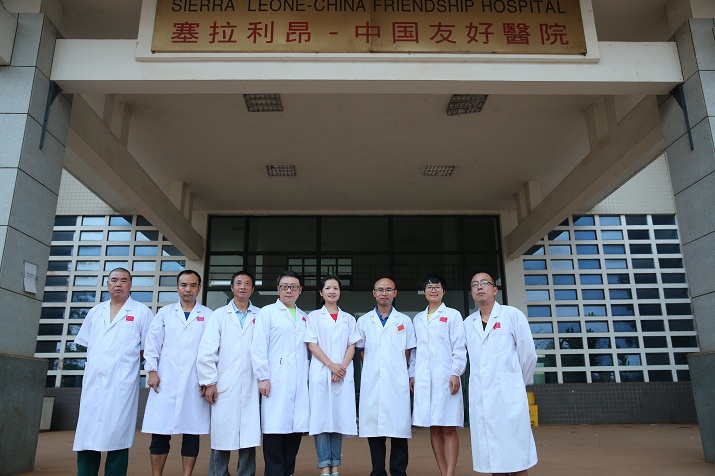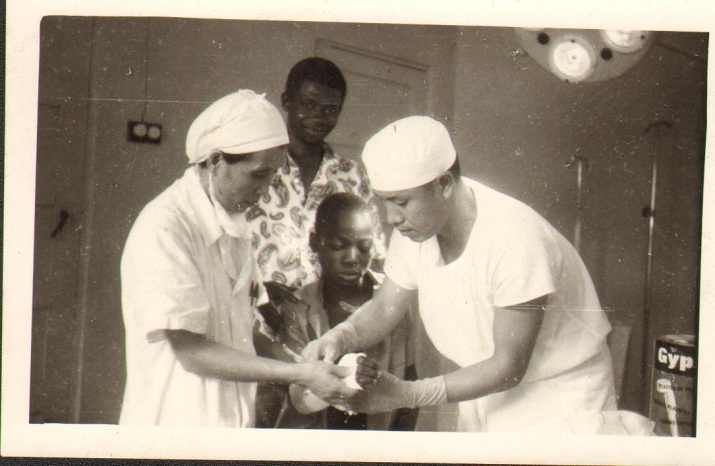|
||||||||||
| Home Nation World Business Opinion Lifestyle ChinAfrica Multimedia Columnists Documents Special Reports |
|
||||||||||
| Home Nation World Business Opinion Lifestyle ChinAfrica Multimedia Columnists Documents Special Reports |
| ChinAfrica |
| Healthcare Without Borders |
| Hunan's hospitals contribute to medical assistance in Africa |
| By Xia Yuanyuan | VOL.11 July ·2019-06-27 |

Some members of the Chinese medical team serving for the 18th term in China-Sierra Leone Friendship Hospital (COURTESY PHOTO)
In 1973, Li Hejun, then a 35-year-old orthopedic surgeon of the Second Xiangya Hospital of Central South University, Hunan Province, wrote in his diary in Sierra Leon, “I am privileged to have a chance to be engaged in international health aid.” At that time, he was a doctor who had been sent to serve his first medical mission in that country.
Today, 46 years have passed, and although his hands are no longer steady, recalling those memories always makes the 81-year-old excited. Assigned by China’s National Health Commission, Hunan has been sending medical aid teams to Sierra Leone and Zimbabwe ever since March 1973. These medical teams were jointly organized by the national commission and Hunan Provincial Health Commission.
Over the past nearly five decades, Hunan Province has sent 36 medical teams, consisting of 438 medical workers, to the two countries, as part of its efforts to echo the Central Government’s call to ramp up medical assistance to the continent.
The report released by the Hunan Provincial Health Commission revealed that, over the period, its medical staff has conducted nearly 200,000 operations, with medical treatment reaching more than 830,000 patients in Africa.
During this time, medical workers from Hunan have always adhered to the philosophy of equality, mutual trust, win-win cooperation, and innovated ways of assistance, offering benefits to the independent development of African countries. The project has made positive contributions to promoting China-Africa medical cooperation and enhancing bilateral people-to-people exchange.
Side by side
“I heard that it takes only 30 hours to fly to Freetown now [from Hunan],” Li told ChinAfrica. “How time flies and the change is great!” He recalls it took him seven days to arrive at Freetown, the capital of Sierra Leone, from Hunan, back in 1973.
Li and his nine colleagues were stationed at Rotifunk Hospital in Freetown, where there was a high prevalence of mosquito-related diseases. Even in the capital, there were almost no sanitation workers, and garbage dumps surrounded by flies were common. Local people were accustomed to eating hand-picked uncooked food, which was more likely to breed disease. “The most common disease then was malaria,” said Li.
Though malaria was rampant in the country, medical equipment and qualified medical staff was scarce, said Li. In the hospital where he was stationed, there was only one local doctor and one nurse.
In just 20 days, the Chinese medical team installed the necessary medical equipment, including drug facilities, radiology equipment and reconstruction of operating rooms.
The equipment brought hope to local patients. In the two years and four months of their stay, Li and his team members treated many local patients, and even patients from neighboring countries who traveled a great distance to seek medical treatment.
In the past 46 years, the Second Xiangya Hospital has sent 18 medical teams with a total of 42 members to Africa. The medical staff covers various disciplines including medicine, surgery, pediatrics, infections, and ophthalmology. The hospital is the first one in Hunan to send medical staff to Africa, it is also among the Chinese hospitals that have dispatched the largest number of medical teams to the continent, making positive contribution to the treatment of typhoid, malaria, Ebola, cataracts and other diseases in African countries.

Li Hejun (right) operates on a child in Sierra Leone in the 1970s (COURTESY PHOTO)
Pain and gain
For half a century, Chinese medical teams have been scattered like pearls on the Africa continent, a report by China’s National Health Commission wrote.
The history of China’s medical assistance to Africa dates back to 1963, when China sent its first medical team to Algeria. Since then China has sent about 20,000 doctors to a total of 51 countries and regions in Africa, where, together with local doctors, Chinese medical staff have saved more than 200 million lives.
Even in modern times, challenges for the Chinese medical teams in Africa remain. One of the biggest challenges was in the post-Ebola period, where infections undoubtedly were a major threat and concern for the team members. In 2016, Hunan dispatched its eighteenth medical team to Sierra Leone. Teng Chaoyu, senior clinical engineer of the Blood Purification Center of the Second Xiangya Hospital, led a team of 20 medical staff to the China-Sierra Leone Friendship Hospital, 30 km away from the capital, that had been active in combating the region’s deadly Ebola outbreak.
“Despite poor medical conditions, homesickness, shortage of water and electricity and threat of diseases, all the team members did their utmost to help the patients,” Teng told ChinAfrica.
Hunan medical teams’ long engagement in Sierra Leone and Zimbabwe has won Chinese medical workers a good reputation on the continent and the trust of African people. In 2006, the then President of Sierra Leone, Ahmad Tejan Kabbah, visited the Second Xiangya Hospital and expressed his government’s appreciation of the professional, ethical and hardworking culture of the Chinese medical teams.
“It shows our devotion is well worth it, because people in Africa never forget us,” said Li.
Zheng Hong, Associate Professor of Anesthesiology of the Second Xiangya Hospital, was a member of the tenth medical team who had worked in two of the largest public hospitals in Zimbabwe - Parirenyatwa Hospital and Harare Central Hospital. For him, memories of his life in the country has special meaning as he had successfully resuscitated a dying baby. When the parents learnt it was a Chinese doctor that had given their baby a second lease on life, they proposed to name the newborn Hong to express their gratitude.
“This is the best gift, and I hope the boy has a healthy and happy life,” Zheng told ChinAfrica.
Fish and fishing
Besides treating disease and saving lives, Hunan’s medical staff have also helped some local hospitals and medical workers formulate advanced health regulations and organize standardized hospital management. Building up capacity and organizing personnel training is also an important part of their work.
Established in 2012, the China-Sierra Leone Friendship Hospital is one of the 30 hospitals funded by the Chinese Government in Africa. In 2016, when 29 year-old Zhang Xiao, a head nurse of the Second Xiangya Hospital, arrived there, it had only one local doctor and about 30 nurses.
“The proportion of physicians and nurses was totally imbalanced, and the nursing staff had to help the doctor do medical work,” Zhang told ChinAfrica. However, the nursing staff did not have the skills to provide clinical work, which seriously affected the quality of medical care. In order to enhance the technical levels of the nursing staff, improve the quality of care and promote the rehabilitation of patients, Zhang and other Chinese staff carried out systematic and high-intensity training sessions, combining theory and practical operation for local nurses, and helped them build a high-tech, high-quality nursing team.
“Give a man a fish and you feed him for a day; teach a man to fish and you feed him for a lifetime,” said Zhang, adding that only when local medical staff can independently perform scientific and systematic medical treatment and care, will there be a “permanent” medical team to provide service to the public.
(Comments to xyy@chinafrica.cn)
| About Us | Contact Us | Advertise with Us | Subscribe |
| Copyright Beijing Review All rights reserved 京ICP备08005356号-5 京公网安备110102005860号 |